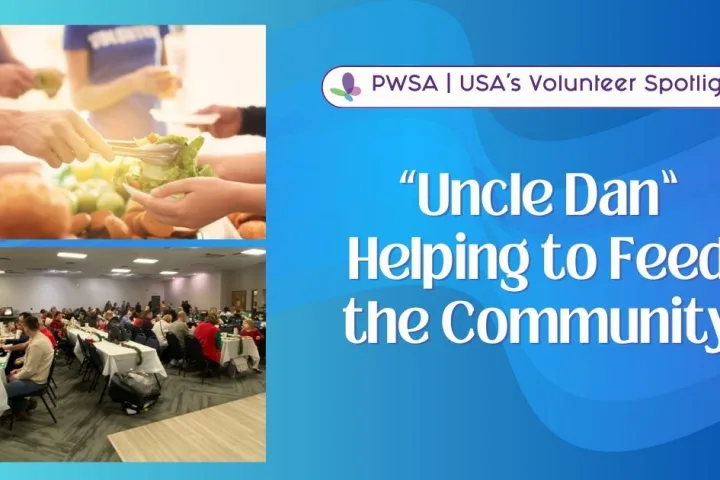We know the importance of exercise for our loved ones with PWS (as well as caregivers if you read last month’s blog on Exercise, Movement, and Mental Health). There are many ways people with PWS can move their bodies to experience the benefits of exercise. Still, sometimes, we have to get creative to get our loved ones moving. People with PWS often need external motivation to get them active. So, how do we motivate our loved ones to get moving?
Help them determine an appropriate goal
Like all of us, our loved ones want to feel they have control. Determining their own fitness goal and how they will achieve it can help them feel more responsible for reaching that goal. You can help them decide on a goal they are inspired to meet and figure out the steps they should take to meet that goal. Help them choose one that you know is achievable. Not something so easy they don’t have to work for it, but a goal you know they can reach. Consider breaking a larger goal down into smaller goals for more immediate results.
Fundraising Motivators
Our Walk a Mile in their Genes advocacy fundraiser is now in full swing. Families have made pages, written their stories, and are collecting donations. (If you haven’t started your fundraising page, it’s not too late! Follow this link to do so.) One of the great elements of this fundraiser is the fitness tracker. It allows participants to track walking, running, biking, or swimming by mileage, time, and elevation. Creating a goal and seeing the miles accumulate on screen can be a big motivator for some people with or without PWS.
Tangible Motivators
If seeing a tally on the screen is not enough motivation for your loved one, try something more tangible. A simple sticker chart can show the achievements they’ve made toward their goal. Try a reward system. After collecting a certain number of stickers, they get something special, like a trip to the movies or a date with a parent or friend.
Audio Motivators
Listening to books is a favored activity in some households and could be used as motivation. If your loved one enjoys listening to stories, then create the expectation that they can listen with headphones while they walk, whether on a trail, on a treadmill, or around the neighborhood. If an Audible subscription is out of your budget, download the Libby app for an online library of free text and audiobooks. Perhaps your loved one prefers music and simply needs to create a fun and inspiring playlist on Spotify.
Cute and Cuddly Motivators
Dogs are also great motivators for individuals with or without PWS. If you have a family dog that loves to take a stroll and isn’t too difficult to handle on a leash for the individual, let your loved one know how important it is for the pet to get regular exercise. Be clear on what a big responsibility it is to walk the dog and how important it is they walk regularly.
Ultimate Goal
Having a schedule and knowing the expectations is essential for so many of our loved ones with PWS. Work with them to create a schedule that gets them moving. Let their inclination towards external motivation be a factor and generate a tally and reward system they appreciate and want to work with. Your family could create a page for our Walk A Mile fundraiser and watch your miles of walking, running, biking, or swimming add up and raise money to help the advocacy efforts of PWSA and families all around the country. Most importantly, find a movement activity your loved one enjoys and help them stay motivated to continue moving.
Share this!





 Perry A. Zirkel has written more than 1,500 publications on various aspects of school law, with an emphasis on legal issues in special education. He writes a regular column for NAESP’s Principal magazine and NASP’s Communiqué newsletter, and he did so previously for Phi Delta Kappan and Teaching Exceptional Children.
Perry A. Zirkel has written more than 1,500 publications on various aspects of school law, with an emphasis on legal issues in special education. He writes a regular column for NAESP’s Principal magazine and NASP’s Communiqué newsletter, and he did so previously for Phi Delta Kappan and Teaching Exceptional Children. Jennifer Bolander has been serving as a Special Education Specialist for PWSA (USA) since October of 2015. She is a graduate of John Carroll University and lives in Ohio with her husband Brad and daughters Kate (17), and Sophia (13) who was born with PWS.
Jennifer Bolander has been serving as a Special Education Specialist for PWSA (USA) since October of 2015. She is a graduate of John Carroll University and lives in Ohio with her husband Brad and daughters Kate (17), and Sophia (13) who was born with PWS. Dr. Amy McTighe is the PWS Program Manager and Inpatient Teacher at the Center for Prader-Willi Syndrome at the Children’s Institute of Pittsburgh. She graduated from Duquesne University receiving her Bachelor’s and Master’s degree in Education with a focus on elementary education, special education, and language arts.
Dr. Amy McTighe is the PWS Program Manager and Inpatient Teacher at the Center for Prader-Willi Syndrome at the Children’s Institute of Pittsburgh. She graduated from Duquesne University receiving her Bachelor’s and Master’s degree in Education with a focus on elementary education, special education, and language arts. Evan has worked with the Prader-Willi Syndrome Association (USA) since 2007 primarily as a Crisis Intervention and Family Support Counselor. Evans works with parents and schools to foster strong collaborative relationships and appropriate educational environments for students with PWS.
Evan has worked with the Prader-Willi Syndrome Association (USA) since 2007 primarily as a Crisis Intervention and Family Support Counselor. Evans works with parents and schools to foster strong collaborative relationships and appropriate educational environments for students with PWS. Staci Zimmerman works for Prader-Willi Syndrome Association of Colorado as an Individualized Education Program (IEP) consultant. Staci collaborates with the PWS multi-disciplinary clinic at the Children’s Hospital in Denver supporting families and school districts around the United States with their child’s Individual Educational Plan.
Staci Zimmerman works for Prader-Willi Syndrome Association of Colorado as an Individualized Education Program (IEP) consultant. Staci collaborates with the PWS multi-disciplinary clinic at the Children’s Hospital in Denver supporting families and school districts around the United States with their child’s Individual Educational Plan. Founded in 2001, SDLC is a non-profit legal services organization dedicated to protecting and advancing the legal rights of people with disabilities throughout the South. It partners with the Southern Poverty Law Center, Protection and Advocacy (P&A) programs, Legal Services Corporations (LSC) and disability organizations on major, systemic disability rights issues involving the Individuals with Disabilities Education Act (IDEA), Americans with Disabilities Act (ADA), and the federal Medicaid Act. Recently in November 2014, Jim retired.
Founded in 2001, SDLC is a non-profit legal services organization dedicated to protecting and advancing the legal rights of people with disabilities throughout the South. It partners with the Southern Poverty Law Center, Protection and Advocacy (P&A) programs, Legal Services Corporations (LSC) and disability organizations on major, systemic disability rights issues involving the Individuals with Disabilities Education Act (IDEA), Americans with Disabilities Act (ADA), and the federal Medicaid Act. Recently in November 2014, Jim retired.